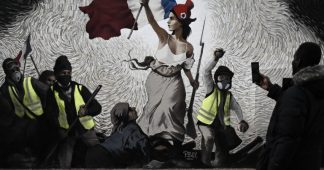By William Mallinson *
The so-called Yellow Vest protests have now been continuing in France for over two months, and show little sign of abating, despite some public relations gestures by President Macron. All manner of comparisons havebeen made between the current social unrest in France and previous revolutions. Sociologists and political science pundits are indeed having a field day, both in France and further afield. But before one can attempt to prognosticate, a number of points need to be made, and briefly elaborated on.
First is that the same things inevitably return, but with different colours: in other words, basic human characteristics, whether individual or corporate, are the same, but manifest themselves in new ways, according to new circumstances. Here, we are seeing a combination of indignation, insecurity and atavism. The first two are pretty obvious, but the latter is often left out of the analytical equation. In the case of France, atavism refers to the age-long tension between Paris and the rest of France. In 1947, a book by Jean-François Gravier was published, under the apt title Paris et le DésertFrançais, republished in 1958 and 1972. It warned of the dangers for France of the imbalance between Paris and other parts of France, and led to more money being poured into the regions outside Paris. This is directly relevant to what is happening now: a tax measure imposed by Paris has led to a reaction in the regions – where agriculture still plays a vital socio-economic rôle – ,which have been more negatively affected than Paris, where salaries are generally higher, most decisions are taken, and financialisation rules the roost. And, of course, the original measure to increase fuel-prices has opened the sluice-gates to general anger and frustration at the increasing difficulty of survival since Macron came to power on a ticket supported and maybe paid for by the financialisation business community. People have now started to think again, and are awaking from the stupor that has resulted from the manic digitalisation of the information age, where so many opinions have been subliminally converted to appinions.
Second, the protests transcend political ideology, even if certain ideologues are trying to prove their point and exploit the situation to their own benefit. This is in any case a normal phenomenon of the beginning of mass protest. While much of what Marx and others wrote about economics may be valid, the majority of protesters are not motivated by any particular ideology, but rather by a sense of frustration and anger with the decisions taken by Paris. The satirical magazine Le Canard Enchainé has always depicted the Presidency as the French royal court. In this connexion, we should recall that the French Revolution occurred throughout France, just as the Yellow Vests are protesting everywhere.
This leads to the third point, namely that the protests are widespread. Although Paris is the symbolic epicentre, we are talking about a pan-French situation. This also explains why the Compagnie Républicaine de la Securité (CRS) are behaving brutally in Paris. Elsewhere, the police, as opposed to the CRS, are more tactile, for example in the Alpes Maritimes, where the coastal areas in particular are a mixture of rich retired people (French and foreign) and many hard-working people. Many of these people, even in the rich areas, are having to penny-pinch on their low salaries.
Fourth, in this climate of increased thinking, the President has come in for increased scrutiny. One idea doing the rounds is that he was planted as a supporter of the financialisation community, simply to help business. Some people are wondering where he was for a while after resigning from his investment banking position and moving into government, and how somebody who was virtually unknown came to prominence so quickly, simply by creating a new political party. Another connected idea was that he was planted to keep out either Marine Le Pen or Jean-Luc Mélenchon. Although such suspicions cannot be forensically proven, they are nevertheless part of people’s thinking.
Fifth, this connects to Le Pen and Mélenchon themselves, who have both expressed their support for the Yellow Vests. Political opportunism apart, it is highly significant that two past presidential candidates, from differing ends of the perceived political spectrum, have come out virtually simultaneously. Whether or not there has been strategic collusion between them is a moot point, although it is unlikely, given their differing ideologies.
Sixth, in Italy, both the leaders of Lega del Nord and the Five Star Party have expressed strong support for the Yellow Vests, the former even clashing with Macron. The protests are becoming more international, and spreading beyond France, reflecting a general malaise in society, connected to the lobotomising and damaging effects on ordinary people (whether from lower or middle socio-economic strata) of the extreme neo-liberal globalisation-fiancialisation order, which is under threat.
France has undergone various developments that appear to have gone unnoticed by the general population, owing to the speed of living and digitalisation, which have detracted from calm reflection. The French Gaullist tradition has typically been one of independence, particularly from the USA. Yet the Blairite Sarkozy took France back into NATO’s military integrated structure; France joined the US and Britain in attacking and destroying the Libyan state; France reneged on a deal with Russia by succumbing to US pressure not to deliver two helicopter carriers that it had built; and joined in with Britain and the US in trying to destroy Syria.
These are the questions that are beginning to come to the fore, as the French wake up and start to think again. As the Yellow Vests become more intellectually coherent and fend off attempts to hi-jack what they are doing, we can expect their struggle to gain increasing support. No amount of posturing with Merkel by re-emphasising the Franco-German relationship will fool thinking people. Having seen what happened to Greece, it is highly unlikely that the French will allow themselves to be battered into submission and made a slave economy, with the connivance of their political leaders.
The question that remains is when and how the Yellow Vests will prevail, and help France and the world to re-establish some sanity and balance in the way in which what people produce is distributed more fairly and intelligently.
* Professor of Political Ideas and Institutions Guglielmo Marconi University











